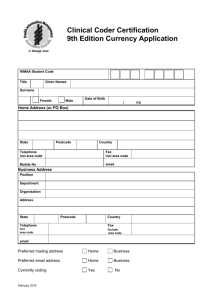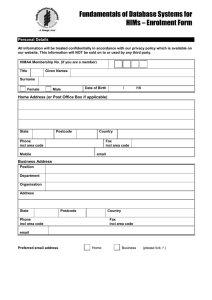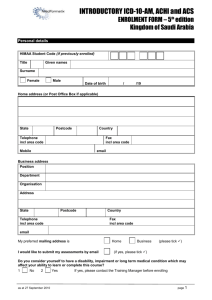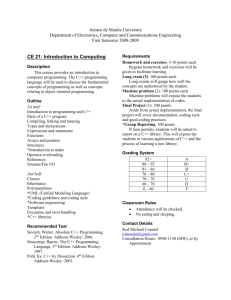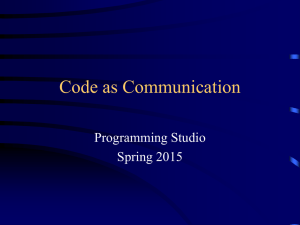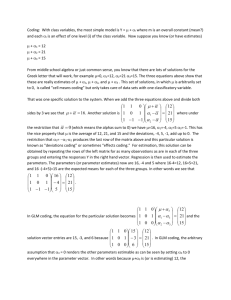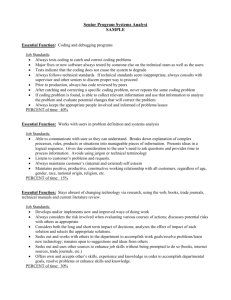to view
advertisement
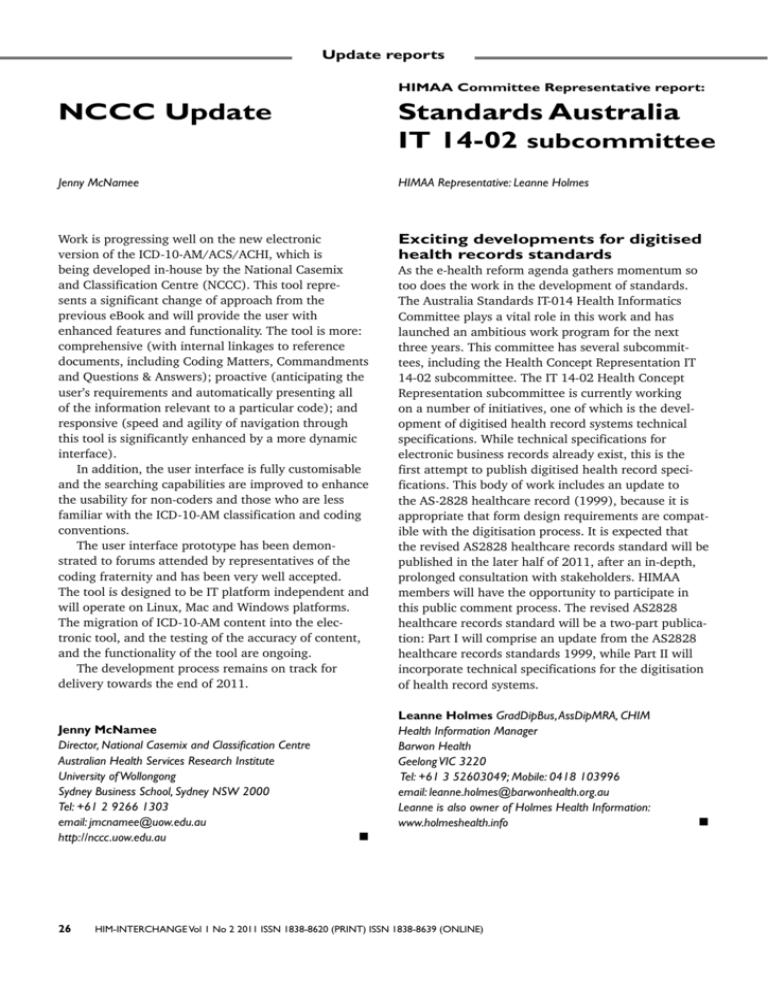
Update reports HIMAA Committee Representative report: NCCC Update Standards Australia IT 14-02 subcommittee Jenny McNamee HIMAA Representative: Leanne Holmes Work is progressing well on the new electronic version of the ICD-10-AM/ACS/ACHI, which is being developed in-house by the National Casemix and Classification Centre (NCCC). This tool represents a significant change of approach from the previous eBook and will provide the user with enhanced features and functionality. The tool is more: comprehensive (with internal linkages to reference documents, including Coding Matters, Commandments and Questions & Answers); proactive (anticipating the user’s requirements and automatically presenting all of the information relevant to a particular code); and responsive (speed and agility of navigation through this tool is significantly enhanced by a more dynamic interface). In addition, the user interface is fully customisable and the searching capabilities are improved to enhance the usability for non-coders and those who are less familiar with the ICD-10-AM classification and coding conventions. The user interface prototype has been demonstrated to forums attended by representatives of the coding fraternity and has been very well accepted. The tool is designed to be IT platform independent and will operate on Linux, Mac and Windows platforms. The migration of ICD-10-AM content into the electronic tool, and the testing of the accuracy of content, and the functionality of the tool are ongoing. The development process remains on track for delivery towards the end of 2011. Exciting developments for digitised health records standards Jenny McNamee Director, National Casemix and Classification Centre Australian Health Services Research Institute University of Wollongong Sydney Business School, Sydney NSW 2000 Tel: +61 2 9266 1303 email: jmcnamee@uow.edu.au http://nccc.uow.edu.au 26 As the e-health reform agenda gathers momentum so too does the work in the development of standards. The Australia Standards IT-014 Health Informatics Committee plays a vital role in this work and has launched an ambitious work program for the next three years. This committee has several subcommittees, including the Health Concept Representation IT 14-02 subcommittee. The IT 14-02 Health Concept Representation subcommittee is currently working on a number of initiatives, one of which is the development of digitised health record systems technical specifications. While technical specifications for electronic business records already exist, this is the first attempt to publish digitised health record specifications. This body of work includes an update to the AS-2828 healthcare record (1999), because it is appropriate that form design requirements are compatible with the digitisation process. It is expected that the revised AS2828 healthcare records standard will be published in the later half of 2011, after an in-depth, prolonged consultation with stakeholders. HIMAA members will have the opportunity to participate in this public comment process. The revised AS2828 healthcare records standard will be a two-part publication: Part I will comprise an update from the AS2828 healthcare records standards 1999, while Part II will incorporate technical specifications for the digitisation of health record systems. Leanne Holmes GradDipBus, AssDipMRA, CHIM Health Information Manager Barwon Health Geelong VIC 3220 Tel: +61 3 52603049; Mobile: 0418 103996 email: leanne.holmes@barwonhealth.org.au Leanne is also owner of Holmes Health Information: www.holmeshealth.info HIM-INTERCHANGE Vol 1 No 2 2011 ISSN 1838-8620 (PRINT) ISSN 1838-8639 (ONLINE) Update reports HIMAA Committee Representative report: HIMAA Committee Representative report: Clinical Coder’s Society of Australia ICD Technical Group (ITG) HIMAA Representative: Jenny Gilder HIMAA Representative: Lyn Williams As a new Director on the Health Information Management Association of Australia (HIMAA) Board it was my pleasure to accept the role as the HIMAA exofficio representative on the Clinical Coder’s Society of Australia (CCSA). I expressed interest in this position because I am actively involved in coding and auditing and across workforce issues relating to clinical coding, particularly in NSW. The CCSA has been an affiliate of HIMAA since 1996; its primary objectives are to support clinical coders across Australia, provide a forum to share ideas and exchange information, and comment on matters relating to clinical coding when studies are conducted. The executive team has representatives from all states and territories, who represent a vast accumulation of knowledge. CCSA members are active in their states, attend coding workshops, have representatives on state coding committees and the ICD Technical Group (ITG), and keep a watching eye on matters of an industrial relations nature that may impact on the clinical coding workforce. I have found it interesting to meet them and gain a global view of issues relevant to clinical coding that extend beyond the boundaries of my own state. A strategy to encourage new clinical coders to enter the field (an issue that seems to impact on all states and territories) is to revisit the mentor program for recently qualified and isolated clinical coders. The message has gone out to CCSA members to match experienced clinical coders with recently qualified and isolated coders, to facilitate workplace visits, involve isolated coders and new coders in meetings, provide new coders with resource materials, share information with them and generally make sure they feel welcome to the coding profession and are not left to struggle on their own.1 The CCSA publishes a newsletter, Codelink, which is distributed to all members. There is a link to the CCSA website (www.ccsofa.org.au) from the HIMAA website (www.himaa.org.au). The new ICD Technical Group (ITG) met for the first time in September 2010. This group replaces the Coding Standards Advisory Committee (CSAC) and will be working closely with the new DRG Technical Group (DTG) to ensure that changes to the coding classification system and the AR-DRG classification system are more integrated. The ITG has been busy working on coding queries from the jurisdictions and developing the 8th edition of ICD-10-AM/ ACHI/ACS. The National Casemix and Classification Centre (NCCC) is currently working on a new electronic ICD-10-AM/ACHI/ACS, which will replace the current eBook. This new product has plenty of extra features and looks like becoming a very versatile and efficient product. The NCCC Information Portal (NIP) has recently been launched and will enable clinical coders to access the latest clinical coding information and errata electronically. In future, it will provide online registration for events and have the ability to download software, products and other information as this becomes available. Jenny Gilder MRL Director, HIMAA Board, Ex-officio Director CCSA 35 Wavehill Ave,Windsor Downs NSW 2756 Tel: +61 2 45725960; Mobile: 0412579050 email:jgilder1@bigpond.com.au Lyn Williams AssDipMRA, Cert IV TAA Training Manager, Education Services Health Information Management Association of Australia Ltd Locked Bag 2045, North Ryde NSW 1670 Tel: +61 2 9887 5032 email: lynw@himaa.org.au 1 HIMAA has approached CCSA in relation to merger discussions and at this stage CCSA is interested in ‘coming to the table’. It seems sensible to reconsider membership categories and offer clinical coders similar benefits to Health Information Managers (HIMs) through full rather than associate membership. This is naturally tied up with the HIMAA membership project. Clinical coder credentialing is another matter under discussion as part of the membership project and it will be interesting to see where discussions, still at a very early stage, will take us all. HIM-INTERCHANGE Vol 1 No 2 2011 ISSN 1838-8620 (PRINT) ISSN 1838-8639 (ONLINE) 27
